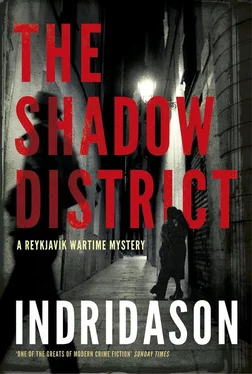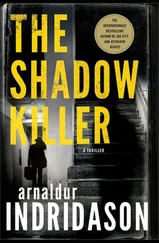‘No,’ said Thorson. ‘He’s an innocent student. A birdwatcher and bookworm who happens to be interested in Icelandic folklore.’
‘They used to say —’
‘Don’t tell me — in the Edinburgh police?’ finished Thorson.
Flóvent smiled. ‘They used to say that you should disregard everything but hard evidence. Any gut feelings we may have about the boy or his digs or his skill at drawing or the fact he’s an innocent bookworm are beside the point. Irrelevant.’
‘Isn’t that just Scottish cynicism?’
‘They knew a thing or two,’ said Flóvent.
He began to examine the source material Jónatan had amassed for his thesis, leafing through the papers until his gaze alighted on an account relating to the huldufólk that appeared to derive from old court records. The handwriting was almost illegible, however, and after peering at it for a while, Flóvent abandoned the attempt to decipher it on the spot and decided to take the pages away to peruse them at leisure.
Thorson was out in the hallway investigating a small wardrobe. He opened it to find two shirts, a folded jumper and some rolled-up socks. Picking up a pair of smart trousers that had been lying in a crumpled heap at the bottom, he searched the pockets and turned them inside out, noticing, as he did so, a rip in the crotch that had been mended so skilfully as to be almost invisible.
Ten minutes later they located the invoice for the mending service, buried in a kitchen drawer.
Jónatan hadn’t slept a wink during his night in the cells. The guards heard him muttering to himself and sobbing quietly. When breakfast was delivered to his cell, he asked after the two policemen who had brought him there. He wanted to get a message to them that he mustn’t miss his classes; he should already have been in a lecture by now and was hoping he would be released as soon as possible. The gravity of his situation still seemed to elude him. He had little appetite and hardly touched his breakfast of porridge served with two slices of liver sausage and a glass of milk.
When Flóvent and Thorson arrived at the prison towards midday, he had finally fallen asleep but started awake when the key was turned in the lock and his cell door opened. Sitting up on the bed, he stared blearily at the two policemen in the doorway.
‘I must have dropped off.’
‘Would you come with us?’ said Flóvent. ‘There’s a room where we can talk.’
‘Are you going to let me go?’ asked Jónatan, standing up.
‘We’re going to have a little chat,’ said Flóvent. ‘We need to ask you a few questions concerning the two girls. After that we’ll see.’
‘I explained to these men that I haven’t got time for this; I’ve already missed some of my lectures.’
Nevertheless, he accompanied them down the corridor and into a small room next to the guards’ coffee room. It contained a table and three chairs, and they all sat down. Flóvent asked if they could have some coffee but Jónatan declined his. He seemed calm and composed; brief as it had been, his rest had done him good. Flóvent reached into his pocket for the composition about the cormorant that he had found in Jónatan’s room and handed it to him.
‘Informative stuff,’ he said. ‘Have you always been interested in birds?’
‘Yes, actually. Ornithology’s a hobby of mine. I’ve always been fascinated by nature, birds especially.’
‘By the cormorant in particular?’
‘No, by seabirds generally. The cormorant is... I like watching it in flight, its elongated neck, the way it plummets into the sea. It’s a wonderful bird.’
‘Did Hrund share your interest in ornithology?’
‘Hrund?’ said Jónatan. ‘I wouldn’t know. I don’t think so.’
‘Tell us again how you knew Hrund,’ said Flóvent.
‘I didn’t touch her,’ said Jónatan. ‘I hope you don’t think I harmed her. Because I didn’t.’
‘Did you talk about birds? You told us yesterday she knew a lot about nature, about birds and plants and so on.’
‘Well, maybe we did. But I can’t really remember.’
Flóvent nodded understandingly. Thorson sat silently at his side. Facing them across the table, Jónatan embarked again on the tale of how he had met the young girl who often used to hang around the petrol station. His account was largely consistent with the one he had provided the day before: they would chat from time to time; she had asked a lot of questions about Akureyri and wanted to move south to Reykjavík, and she was open to the idea that the hidden people really existed.
‘And the subject came up because she knew of your interest in such things?’ said Flóvent, once Jónatan had finished.
‘Yes. She knew I was going to university. I told her I wanted to read Icelandic and history.’
‘Did you regard her as a subject for your research?’ asked Thorson.
‘A subject for my research? No.’
‘Well, she told you her ideas about the huldufólk , didn’t she?’
‘Yes, I suppose so.’
‘Which were?’
‘All the usual stuff about enchanted mounds and elf rocks. She knew lots of stories too. Nothing out of the ordinary, though.’
‘Had she had any encounters with supernatural beings herself?’
‘She didn’t say.’
‘She didn’t discuss it with you?’
‘She never mentioned it, no.’
‘She’d never been molested in any way by a supernatural being?’ asked Flóvent.
‘You asked me that before. I’ve no idea.’
‘She didn’t tell you?’
‘No.’
‘Are you sure about that?’
‘Yes. Anyway, I don’t believe in that sort of thing. If she had, it would have been a figment of her imagination.’
‘Oh, that’s right, you don’t believe in the existence of such creatures. They belong purely to the world of fairy stories.’
‘Yes. Of course. Not that I’m familiar with the type of malevolence you’re referring to in tales of the huldufólk . After all, they’re mostly told by women, passed down from mother to daughter. That’s essentially how they’ve survived. And because they’ve been kept alive by women, they reflect a female view of the world, feature concerns close to their hearts. They tend to be stories about faithless lovers, childbearing, the exposure of infants.’
‘Exposure of infants?’ queried Flóvent.
‘Some things don’t change much.’
‘What do you mean?’ asked Thorson.
Jónatan looked from one of them to the other, seeking to make himself understood. ‘The stories often describe the harsh lot of women. Such as giving birth to a child out of wedlock and being forced to dispose of it. Exposure of infants was the abortion of its day. Naturally it would have been a harrowing experience and the huldufólk stories were a way of glossing over the harsh reality and easing the mental anguish. They offered an alternative world in which women have children with handsome, gentle men of the hidden race, who are the antithesis of their brutish human counterparts. The infants are left out in the open for their fathers to find, and grow up, cherished, among their father’s people, and may even return one day to the human world. In other words, the stories serve to alleviate a distressing experience.’
‘Handsome, gentle men?’ repeated Thorson.
‘Like the Yanks,’ said Jónatan.
‘Are they the new huldufólk ?’
‘In a manner of speaking.’
‘How do you feel about that?’ asked Thorson.
‘Me? I don’t have an opinion.’
‘Are you involved with any women yourself?’
‘What’s that got to do with anything? Why are you asking me that?’
‘Maybe everything we’re asking is relevant; maybe none of it is,’ said Flóvent. ‘We’d appreciate it if you simply gave a straight answer to the question.’
Читать дальше












